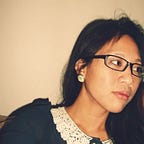This story was originally published on July 22nd, 2013. I was 20 years old. It was eventually republished on The New Local (defunct). I re-share it now, unedited (although some parts make me cringe; and other parts, of course, no longer reflect my feelings). I’ve started writing a new piece, “Living in Liminal Spaces” — to explore my continuing, evolving identity as a Chinese-Trinidadian woman in her mid-20s.
I am the child of two immigrants. Immigrants from the East who came to the West, the New World, the “free world”, with their harsh accents and superstitions. Don’t mind that they arrived on a small island, with pothole-ridden roads and “developing” status. In this hemisphere, things can happen. We saw it in the days of Columbus and his supposed discovery, the emergence of the United States as one of the greatest superpowers in the world. Once a upon a time, Haiti was the Pearl of the Antilles. In this hemisphere, there is the American Dream.
Essentially, the most of us are here as a result of immigration. Europeans fleeing prosecution or finding riches, Africans imported for labour, Chinese and Indians and Syrians and everybody else trickling in slowly and surely to create this callaloo, this cosmopolitan world of the West. And these early immigrants have children and those children have children, maybe there’s some miscegenation, by force or by love, but eventually you were born and you are here. Some of us have ideas of our ancestral roots. You think you came from French planters or have West African blood, you know your great-great-whoever was from Calcutta, you tried to explain your curly hair and slanty eyes although you’re never really sure. And while all these people are being born and becoming local natives of their destined country, more and more immigrants continue to come. The diaspora is growing, it’s spreading like wildfire. People begin to write about this diaspora, their sense of displacement, their anger at colonialism, their deculturalisation, their need to understand who they are, where they are from and why they are where they are.
In the Caribbean, I am at home. I am another child of a pair of immigrants. They just immigrated a lot later than other people. But at the same time, being second-generation and being fourth- or fifth-generation are very different experiences. There are people of Syrian descent here who own shopping malls and cloth stores. And then there are Syrian people who run gyro carts, whose mother tongue is not English, who are staunch Muslims and who can only fathom ever owning their own cloth store. At some point in my young life, I decided to make a clear differentiation between Chinese and Chinese-Trinidadian and what it means to be “of descent” and not. For example, my parents are Chinese but I am Chinese-Trinidadian. But maybe my parents are Chinese-Trinidadian too because they’ve been here for at least two decades. To most people, this doesn’t really matter. We are all “Chinee”. We are Mary, we are China Man / Woman. Sometimes, people will ask if you are a “local chinee” or a “chinee chinee from China”. So maybe, it does matter… a little bit.
Being second-generation means having a different first language from your parents which often results in miscommunication or totally lack of communication. Along with language barrier, there is also a cultural barrier and generation gap. How do two older people from southern China raise two teenage females in the West? With a lot of patience. I grew up around mah jong Sundays, burning incense to ancestral shrines at home, too much jasmine rice, and every other aspect of Chinese culture my parents tried to transport with them. However, I also grew up around Carnival, playing Trini handclap games, and too much KFC. Personally, finding the balance between these two worlds was difficult growing up, but you learn to deal with it and develop that equilibrium in your life where you can pursue your clichéd Western ideals without totally upsetting your parents. Sometimes, I wonder what I would be like if I was born and raised in Zhongshan. A lot of times, I feel guilty that my speaking Cantonese is absolutely wretched. Nevertheless, I’ve found my place here, a place with a history of immigration and a history of people who’ve felt like me.
